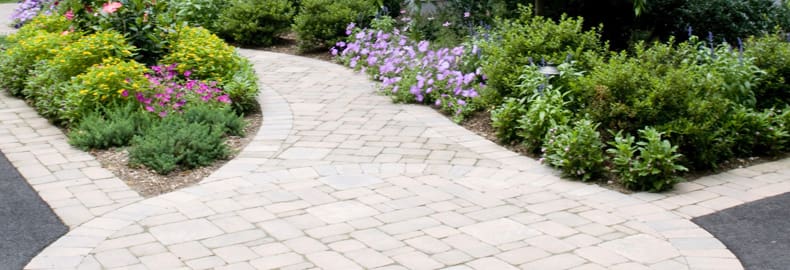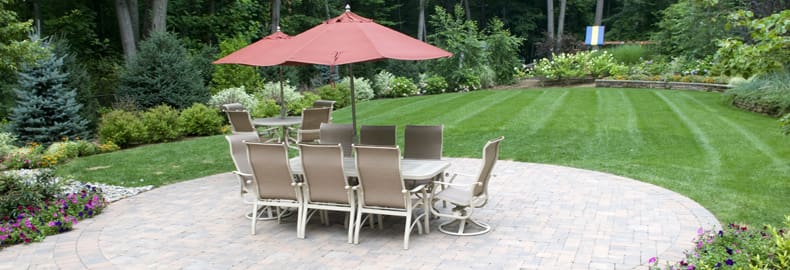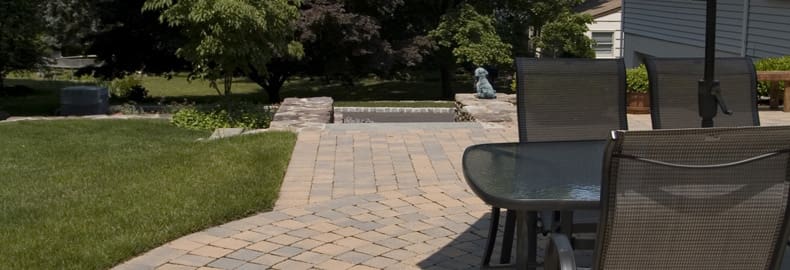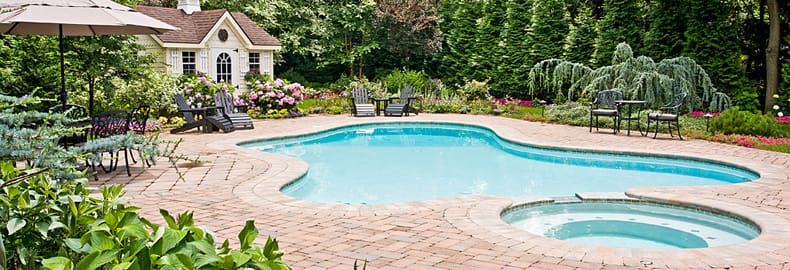If you’re thinking about building a new patio this spring, or just giving your old one a facelift, outdoor patio pavers can be the perfect solution for the job. They are durable, affordable and easy to maintain. Pavers come in a wide range of materials in different shapes, sizes, colors and finishes. It’s important to know all of your options, so you can choose the best one for your Bergen County home.

What are Pavers?
Pavers are hard blocks used primarily outdoors to create a smooth, hard surface. They can be used for numerous outdoor areas like outdoor patios, terraces, walkways, pathways, driveways, porches, steps and retaining walls. They require little maintenance and hold up well in any outdoor climate. They can easily withstand extreme heat and cold, rain and sleet, frost and snow and even fire. Most outdoor patio pavers are made from natural materials that hold up for many years under a lot of wear and tear.
A key feature that makes pavers so popular for outdoor home projects is their thickness. Pavers, in any material, are much thinner than regular building products made from the same material. This makes them lighter to handle, faster to install and less expensive. Many pavers have interlocking joints, so you don’t need grout to install them. You get all the benefits of standard building materials without the bulky weight, time-consuming installation and additional expense. Take a look at the wide selection of outdoor patio pavers for your home.

1. Concrete Patio Pavers
Concrete pavers may surprise you. They come in a variety of sizes, shapes, textures and colors that are quite appealing. There are plain textures, geometric patterns and intricately embossed patterns. Some patterns mimic other materials like slate and quarry stone. Concrete outdoor patio pavers are more durable that asphalt and more colorful than brick. Modular shapes make them easy to install and replace, especially for DIYers, and they’re available at most home improvement stores.
Concrete pavers are made from portland cement, water, sand and gravel. Interlocking pavers are made with edge spacers to create uniform joints. They’re suitable for all outdoor uses, including driveways, and they have a lifetime warranty.
Concrete outdoor patio pavers have a slip resistant surface that’s easy to clean and maintain. Individual pavers are resistant to freezing temperatures and resilient to ground movement. They can easily be replaced if damaged. A sealer should be used to protect against stains and color changes over time.

2. Brick Patio Pavers
Brick outdoor patio pavers create a classic, timeless look for your Bergen County home. They add traditional character and a casual, comfortable setting to any patio. They are much thinner than regular bricks, but provide strength and durability for heavy traffic. Brick pavers are available in different sizes, shapes, colors and finishes that are made to look old and new.
Brick pavers are about the same price as concrete pavers, but offer a more traditional appearance. Brick pavers can be easily combined with other pavers like concrete and stone used as borders or accents to create a custom design and unique look. As a porous, fired-clay material, brick dries quickly from heat and sun, but can form a slick mossy film if used in moist shady areas. Brick pavers can be sealed, but they hold up well without a sealer in most outdoor conditions.

3. Natural Stone Patio Pavers
Outdoor patio pavers can be cut from any type of stone, but most pavers on the market are granite, marble, limestone, travertine and slate. These natural stones offer the strength and durability needed for outdoor use. Typical cut stone pavers come in modular shapes with standard sizes that range from 6” x 12” rectangles up to 24” x 24” square. Uncut stone pavers have a rough appearance with irregular edges.
Depending on the stone selected, colors vary in stone pavers from light beige tones to dark gray tones. Tumbled or honed stones have a rough texture that looks very natural and casual. Polished stones have a sheen that provides a more sophisticated, elegant appearance. Natural stones are porous and need to be sealed once or twice a year for protection from spills, stains and weather conditions.
- Granite – Made from igneous rock found deep within the earth, granite is the hardest of all the natural stones. It’s known for its hardness, strength and durability. It’s the least porous of the natural stones, but should be sealed for best wear. Granite is resistant to outdoor conditions that cause aging and weathering and holds up well in cold northern NJ winter weather.
- Marble – Marble is a metamorphic rock that’s created by a crystallization process caused by intense heat in the ground. Marble has characteristic veins in varying colorations that run through the stone. It’s available in various colors from white to black and tumbled or polished finishes.
- Limestone – A hard sedimentary stone formed under water, limestone contains traces of fossils from marine life and shellfish that give it a rich, light-colored appearance. It’s available in tumbled and polished finishes that have a rich, elegant appearance.
- Travertine – Similar to limestone, travertine contains lime deposits that add color variations. It has a rich, elegant look that improves with age. Travertine has a non-slip surface that never gets hot which makes it a great choice for outdoor use. Although travertine is porous, it comes in rich colors don’t fade over time.
- Slate – Slate is a beautiful natural stone with strong color variations and a slightly uneven surface. It’s a hard stone that’s durable and easy to maintain outdoors. The strong color variations in slate outdoor patio pavers create a lot of visual interest with casual appeal.
Although outdoor patio pavers are fairly easy to install, hiring a professional landscape contractor in Bergen County is advised for best long-term results. A level ground surface and proper preparation is essential to good results. An uneven surface area can result in pavers that can crack, slip and retain water in the soil around the pavers. A DIY project requires digging up the ground, leveling the ground’s surface and preparing the area with proper materials. Unless you have the right equipment, tools, skills and plenty of time, it’s best to hire a professional to handle the job.
